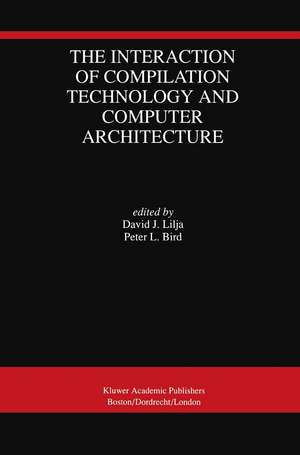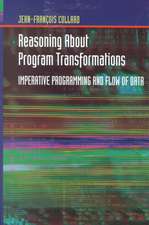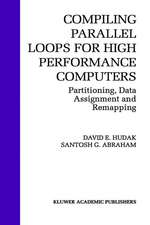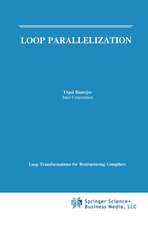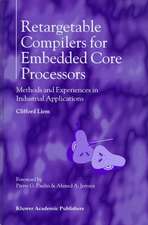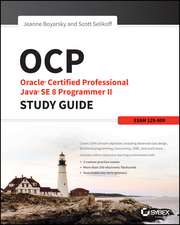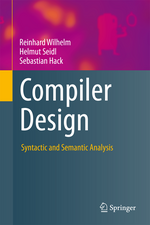The Interaction of Compilation Technology and Computer Architecture
Editat de David J. Lilja, Peter L. Birden Limba Engleză Hardback – 31 mai 1994
| Toate formatele și edițiile | Preț | Express |
|---|---|---|
| Paperback (1) | 645.65 lei 6-8 săpt. | |
| Springer Us – 4 oct 2012 | 645.65 lei 6-8 săpt. | |
| Hardback (1) | 652.22 lei 6-8 săpt. | |
| Springer Us – 31 mai 1994 | 652.22 lei 6-8 săpt. |
Preț: 652.22 lei
Preț vechi: 815.27 lei
-20% Nou
Puncte Express: 978
Preț estimativ în valută:
124.82€ • 135.53$ • 104.85£
124.82€ • 135.53$ • 104.85£
Carte tipărită la comandă
Livrare economică 22 aprilie-06 mai
Preluare comenzi: 021 569.72.76
Specificații
ISBN-13: 9780792394518
ISBN-10: 0792394518
Pagini: 285
Ilustrații: VIII, 285 p.
Dimensiuni: 155 x 235 x 18 mm
Greutate: 0.6 kg
Ediția:1994
Editura: Springer Us
Colecția Springer
Locul publicării:New York, NY, United States
ISBN-10: 0792394518
Pagini: 285
Ilustrații: VIII, 285 p.
Dimensiuni: 155 x 235 x 18 mm
Greutate: 0.6 kg
Ediția:1994
Editura: Springer Us
Colecția Springer
Locul publicării:New York, NY, United States
Public țintă
ResearchCuprins
1 Introduction and Overview.- 1 Introduction.- 2 Overview of the Book.- 3 Conclusion.- 2 Architectural Support for Compile-Time Speculation.- 1 Introduction.- 2 Speculative Execution.- 3 Global Instruction Scheduling.- 4 Experimental Results.- 5 Conclusion.- 3 Register Requirements for High Performance Code Scheduling.- 1 Buffer Space is Critical.- 2 Cyclic Scheduling.- 3 Register Requirements For Cyclic Schedules.- 4 Architectural Models.- 5 Bounding Register Requirements.- 6 Experiments.- 7 Summary.- 4 Data Dependencies in Decoupled, Pipelined Loops.- 1 Introduction.- 2 Architecture Overview.- 3 Background.- 4 Compiling Common Sub-Expressions.- 5 Loop Carried Dependencies.- 6 Conclusions.- 5 The Effects of Traditional Compiler Optimizations on Superscalar Architectural Design.- 1 Introduction and Background.- 2 Methods And Tools.- 3 Performance Metrics.- 4 Experimental Evidence.- 5 Conclusion.- 6 Dynamic Program Monitoring and Transformation Using the Omos Object Server.- 1 Introduction.- 2 OMOS and Linker Technology.- 3 Server Architecture.- 4 OMOS Program Monitoring.- 5 Reordering Strategies.- 6 Fragment Reordering.- 7 The Results.- 8 Related Work.- 9 Future Work.- 10 Conclusion.- 7 Performance Limits of Compiler-Directed Multiprocessor Cache Coherence Enforcement.- 1 Introduction.- 2 Coherence Schemes.- 3 Previous Work.- 4 Performance Comparisons.- 5 Conclusion.- 8 Compiling hpf for Distributed Memory Mimd Computers.- 1 Introduction.- 2 HPF Language.- 3 HPF Compiler.- 4 Partitioning.- 5 Communication.- 6 Run-time Support System.- 7 Optimizations.- 8 Experimental Results.- 9 Summary of Related Work.- 10 Summary and Conclusions.- 9 The Influence of the Object-Oriented Language Model on a Supporting Architecture.- 1 Introduction.- 2 Overview of the MUSHROOM architecture.- 3 Compilation technology.- 4 Software control of low-level features.- 5 Experiences designing the prototype.- 6 Summary and conclusions.- 10 Project Triton: Towards Improved Programmability of Parallel Computers.- 1 Introduction.- 2 Modula-2*.- 3 Optimization Techniques and Hardware Recommendations.- 4 Triton/1.- 5 Status and Future.- 6 Conclusion.
